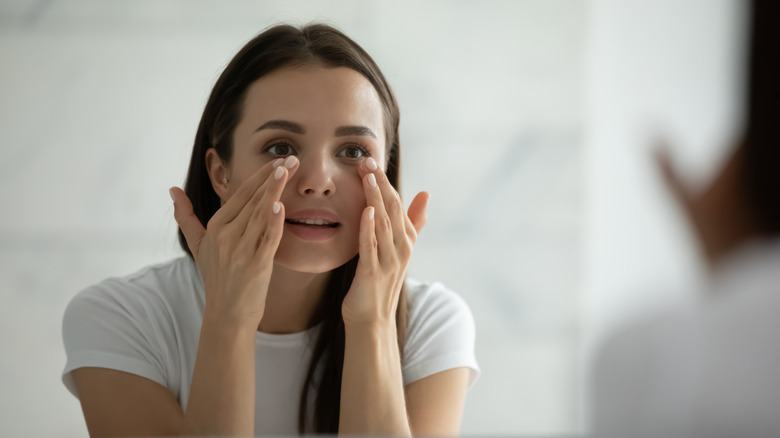Why You Need To Switch Up Your Moisturizing Strategy For Summer (You Can Actually Overdo It)
One of the best accessories for summer is glowy, moisturized skin. After the harsh, dry months of winter, it is refreshing not to think as much about keeping your skin hydrated and moisturized. Or so you'd like to think. Because of the changes in humidity and temperature in the summer, your skin will have different needs than in the winter. Your go-to winter moisturizer may be far too heavy when the warmer months roll around, and you could actually be doing more harm than good to your skin.
Changing a reliable skin-care routine can feel daunting, especially if you just got settled into a groove with your go-to favorites. Not to mention how confusing it can be to find the right products for your needs. The good news is you don't have to change your entire skin routine, as focusing on having a summer-ready moisturizer can carry most of the work for ensuring healthy, hydrated, and moisturized skin.
Why you shouldn't use your winter moisturizer
The moisturizers our skin typically needs in colder weather tend to be very creamy, thick, and rich because the dry air of winter zaps moisture from our skin. A thicker hydrating cream will offer a better sealant for moisture during the day and night, according to Skin Care Clinics. But as the warm weather begins to arrive along with rising humidity levels, your go-to heavy winter cream can do its job a little too well. Believe it or not, there is such a thing as moisturizing your skin too much. Doing so can cause your skin to think that it doesn't need to produce as much moisture, according to Garnier. By using these winter creams, you trick your skin into thinking it has all the water and protein it needs when that isn't the case.
Not to mention, too much moisturizer can cause acne, especially in the summer. Because your skin requires less moisturizer in the summer, Stryx explains that once your skin absorbs the amount of product it needs, any excess can clog your pores. Using a product that is not as heavy can help you avoid this.
Do you have to moisturize in the summer?
Though it can be tempting to cut out this step in your skin-care routine, it is still important to keep moisturizing in the summer. Vogue Arabia explains that even though there is more humidity in the air, the higher UV rays from the sun can still majorly dry out your skin's natural oils. For certain skin types, this can lead to an uptick in oil production and make you look even greasier and sweatier. We are looking for dewy summer skin here, not oily summer skin.
Our bodies can lose moisture in the summer from sweating, so it is important to hydrate and lock that hydration in with a moisturizer. Plus, many of us retreat into air-conditioned spaces in the summer. The cold dry air from this can dry out our skin, even if it is a sweltering day outside, according to Dr. Wang Herbal Skincare.
What kind of moisturizer to try instead
The key to having fresh summer skin is to find a lightweight, water-based moisturizer, per Beauty Bay. A thinner moisturizer will allow your skin to breathe and absorb the product without becoming greasy or overworked. Additionally, one of the secrets to defeating summer acne is finding an oil-free moisturizer since your skin naturally produces more oil in the summer. Using a moisturizer that features glycerin can be helpful because it absorbs quickly and helps protect the skin barrier and reduce fine lines, according to Kiehls.
Searching for a moisturizer with an SPF can ensure you are blocking out the drying UV rays and protecting your skin's hydration barrier as well. "Moisturizers with sun protection and antioxidants are perfect for summer dry skin," board-certified dermatologist Dr. Diane Madfes told Garnier. "You get the benefit of hydration and protection." Just be sure not to overdo it when applying your moisturizer. Stick to a thin layer to start and reapply after periods of swimming, sweating, or long sun exposure. The correct application ensures your skin gets the most out of the product without causing more problems.



